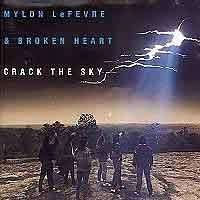Crack the Sky (Mylon LeFevre and Broken Heart album)
Crack the Sky is an album recorded by Mylon LeFevre in 1987 and released in 1987.
| Crack the Sky | ||||
|---|---|---|---|---|
 | ||||
| Studio album by | ||||
| Released | 1987 | |||
| Recorded | 1987 | |||
| Label | Myrrh | |||
| Producer | Mylon LeFevre, Joe Hardy | |||
| Mylon LeFevre chronology | ||||
| ||||
Track listing
| No. | Title | Length |
|---|---|---|
| 1. | "Crack the Sky" | |
| 2. | "Love God, Hate Sin" | |
| 3. | "Closer than a Heartbeat" | |
| 4. | "Give It Up" | |
| 5. | "I Belong" |
| No. | Title | Length |
|---|---|---|
| 1. | "Let Me Be the One" | |
| 2. | "Reach For the Sky" | |
| 3. | "Heart on Fire" | |
| 4. | "For My Growing" (duet with Carole Ford) |
Personnel
- Mylon LeFevre - vocals, guitars
- Ben Hewitt - digital drums, percussion
- Kenneth Bentley - bass, vocals
- Scott Allen - guitars, vocals
- Paul Joseph - synthesizers, vocals
- Michael Tyrrell - guitars, vocals
- Trent Argante - guitars, vocals
gollark: @@@@@@<@236831708354314240><@&453380648611348500>@@@@@@@@@@@@@@@@@@@@@@@@@@@@@@@@@@@@@@@@@@@@@@@@@@@@@@@@@@@@@@<@!330678593904443393>@@@@@@@@@@@@@@@@@@@@@@@@@''''
gollark: Okay, I managed to compress the WHYJIT compiler into a single discord message.
gollark: ```pythonimport argparse,subprocess,random,stringparser = argparse.ArgumentParser(description="Compile a WHY program using WHYJIT.")parser.add_argument("input",help="File containing WHY source code")parser.add_argument("-o","--output",help="Filename of the output executable to make",default="./a.why")parser.add_argument("-O","--optimize",help="Optimization level",type=int,default="0")#parser.add_argument("-d","--drawkcab",help=".sdrawkcab elif ecruos YHW eht ssecorP")args = parser.parse_args()def randomword(length): letters = string.ascii_lowercase return ''.join(random.choice(letters) for i in range(length))def which(program): proc = subprocess.run(["which",program],stdout=subprocess.PIPE) if proc.returncode == 0: return proc.stdout.replace(b"\n",b"") else: return Nonedef find_C_compiler(): compilers = ["gcc","clang","tcc","cc"] for compiler in compilers: path = which(compiler) if path != None: return pathdef build_output(code,max): #if args.drawkcab: code = code[::-1] C_code = f"""#define QUITELONG long long intconst QUITELONG max = {max};int main() {{ volatile QUITELONG i = 0; // disable some "optimizations" that RUIN OUR BEAUTIFUL CODE! while (i < max) {{ i++; }} {code}}} """ heredoc = randomword(100) devnull = "2>/dev/null" shell_script = f"""#!/bin/shTMP1=/tmp/ignore-meTMP2=/tmp/ignore-me-tooTMP3=/tmp/dont-look-here cat << {heredoc} > $TMP1{C_code}{heredoc}sed -e '1,/^exit \$?$/d' "$0" > $TMP3chmod +x $TMP3$TMP3 -x c -o $TMP2 $TMP1chmod +x $TMP2$TMP2exit $?""".encode("utf-8") with open(find_C_compiler(),"rb") as f: return shell_script + f.read()with open(args.input,"r") as f: contents = f.read() looplen = max(1000,(2 ** -args.optimize) * 1000000000) code = build_output( contents, looplen ) with open(args.output,"wb") as out: out.write(code)```
gollark: (and so, code gold was invented)
gollark: Maybe if I compress it manually a bit...
This article is issued from Wikipedia. The text is licensed under Creative Commons - Attribution - Sharealike. Additional terms may apply for the media files.